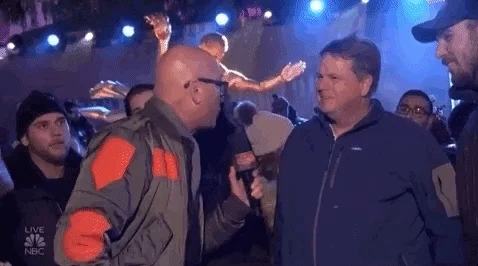Originally published at: James Brown: The Godfather of rap? | Boing Boing
…
He preached and some saw the light.
Why does he wave his hands around so much? Why does he sound so… earnest?
rap openly homages its forebearers
I’m sure that many artists genuinely wish to pay homage to their forebears**, in many cases.
Equally, I am sure it is often the case that someone just wants to use a clip that ‘works’ in their musical vision and there may be no particular thoughts of paying homage.
** homage is not a verb and forebears does not need an additional ‘er’ at the end. One pays homage and they are not forebearers.
I am not familiar with these two fine young gentlemen’s oeuvre or musical predilections, so cannot pass comment. ![]()

Godfather of hip hop, maybe. Godfather of rap, no.
Listen to this … recorded in 1968 by a 64-year-old … listen to the phrasing … it’s old skool rapping, 10 years before its time.
i could also bring in Charlie Mingus and “Original Faubus Fables” from 1961 as being proto-Busta Rhymes, but that might be a stretch. Rap existed before rap was known as a thing.
When Rap started to blow up, I heard some late night FM DJ call Bob Dylan’s “Subterranean Homesick Blues” “Jewish rap from 1965.”
This is the one that has:
Johnny’s in the basement
Mixin’ up some medicine
I’m on the pavement
Thinkin’ 'bout the government, etc.
Obliged to say my favorite line is “Twenty years of schoolin’ and they put ya on the day shift,” 'cuz wasn’t it the truth for a lot of us?
.
Gil Scott-Heron, too, perhaps?
Clareance Reid aka as Blowfly was the original rapper
A lot of early sampling or use of break beats was a closely guarded secret. DJs would intentionally deface the labels on the records they used so others wouldn’t know what they were using. James Brown was heavily sampled in early hip-hop — especially the break from Funky Drummer.
But many more obscure songs were sampled as well. Nothing has been sampled more than the break from Amen Brother by The Winstons.
A sample so ubiquitous that there are entire genres of music built around it.
Sadly nobody involved in the making of that song ever received a dime in royalties despite it being the most sampled song ever.
Nor did Clyde Stubblefield, the funky drummer of Funky Drummer fame, ever get any royalties from his contributions to popular music, either.
the closest they got a blu ray daddy’s got a brand new bag… was a prime time item for live at montreux
Yeah, and you nailed it with Mingus and @David_Guilbeaul’s Gil Scot Heron. However, James Brown was using the term rap for his “spoken word” segments pretty early. I don’t remember the track name, but in one earlier recording he clearly says “Let me rap at ya.” before going into a verbal/scat segment.
I think, with a lot of genre stuff it’s easy to get bogged down with defining who “created” it when, in reality, there were multiple people picking up on similar and disparate cues and sometimes arriving at very similar points at the same time. Did The Beatles create heavy metal with “Helter Skelter”? There’s a persuasive argument to be made, but Cream, the Stones and others were dabbling in a lot of the elements it evolved from pretty early.
So, did James Brown create rap? Absolutely. But a few other folks did, as well.
Even
had a precedent:
when the Red Hot Chili Peppers covered it way back in the 80s, they arranged it explicitly into a rap song.
but neither they nor your radio dj were the only ones to notice. presumably a producer or other label figure gave Bob enough coke to make the intro for a Kurtis Blow song
for completeness’ sake I’ll include a much later sample of Dylan getting the final mic pass of a rhyme on the Check Your Head lp
Mike D later averred that he was able to negotiate the sample clearance down by calling Dylan directly.
James Brown had his own musical genre but he was never able to resist biting off on the latest thing out there. I wanted him to stop when he put out “It’s not the Express (It’s the Monorail)”.
Hip-hop owes a lot to Jamaican musical culture as well. I only found out recently that DJ Kool Herc was born in Jamaica, and was explicitly trying to recreate what he remembered of sound-system culture in New york (including soaking the labels off his records so no one could copy his tunes).
Realistically though, there’s no one single godfather of hip-hop. If James Brown had never existed, today’s music would sound different, but there’d still be hip-hop.






